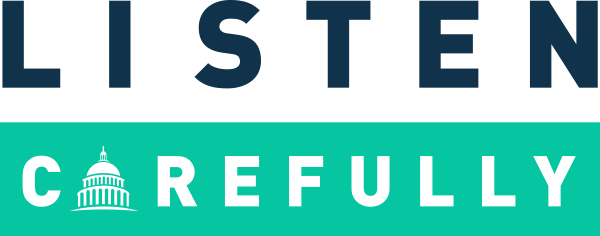Bridging the conversation between hearing health professionals and lawmakers in Washington

Understanding FDA’s OTC Hearing Aid Rule
The journey to the Food and Drug Administration’s (FDA) final OTC hearing aid rule started in 2017, when Senator Elizabeth Warren and Senator Chuck Grassley introduced the bi-partisan OTC Hearing Aid Act. A few years later, in 2021, FDA issued a proposal establishing a new category: OTC hearing aids for people “over 18 with mild to moderate hearing loss.” Recently, August 16, 2022, FDA released its final regulations regarding over the counter (OTC) hearing aids.
The FDA’s final ruling defines OTC hearing aids as products intended for individuals who are 18 years of age or older with perceived mild to moderate hearing loss. More specifically, OTC hearing aids do not require a visit to a hearing healthcare provider and will be available for purchase as early as mid-October of 2022.
Patients and Consumers
Listen Carefully believes the best outcomes include consultation and guidance from licensed, trained hearing health professionals. If you are considering an OTC product and have questions or concerns about your hearing, don’t hesitate to visit a local hearing healthcare professional.
What Does This Mean?
Hearing Health Professionals
Now, more than ever, it’s important to educate your patients on the dangers of these devices when used inappropriately. Encourage patients to continue seeking guidance from hearing health professionals, even if they decide to purchase an OTC hearing aid. This is critical to maintain healthy long-term hearing health.

Frequently Asked Questions
With OTC hearing products rapidly coming to market, we wanted to provide more insight into these new hearing health options by answering a few questions.
How are OTC devices different from traditional hearing aids?
OTC hearing aids are intended for individuals who are 18+ with perceived mild to moderate hearing loss. These devices do not require a visit to an audiologist or hearing instrument specialist. OTC hearing aids are a one-size-fits-most style of hearing aid and have limited customization capabilities for sound quality, but do require a volume control. Some models may provide simple customization options via an app. These products are do-it-yourself, and there is no law requirement for return policy for these hearing aids. Traditional, prescription hearing aids require a hearing evaluation by a licensed hearing health professional and are programmed to the patient’s unique hearing loss. Any degree of loss can benefit from prescription hearing aids. Follow up care, such as adjustments to the devices, cleaning, and repair, and servicing are provided through the hearing professional. Return policies for prescription hearing aids are mandated by the state. Can hearing health providers offer OTC hearing aids in their practice? Yes. Licensed and unlicensed individuals can sell OTC hearing aids. However, a state cannot require a license to sell OTC hearing aids, but a licensed individual can advertise that he/she is licensed. Will traditional hearing aid manufacturers have OTC hearing aids? Being experts on hearing technology for decades, it is likely that hearing aid manufacturers will have, or currently do have, offerings for OTC hearing aids. Is there more advocacy required to promote patient safety with OTC hearing aids? We are currently in the process of reviewing the more than 200-page rule in its entirety. While more advocacy work may be on the horizon, Listen Carefully is thoughtfully reviewing the regulations to ensure all elements are considered. What should I do if I have additional questions or want to learn more about OTC hearing aids? You can reach out to hello@listencarefully.com to learn more about OTC hearing aids.
